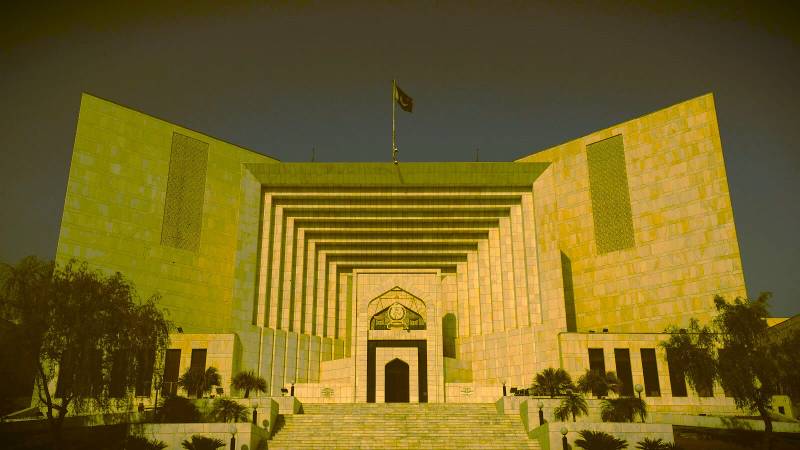
The Supreme Court has asked the federal government to explain why it should allow their intra-court appeal in the Afiya Shehrbano Zia Case — seeking to overturn a previous cord decision to allow misconduct proceedings against retired and former judges.
While adjourning the case for two weeks, the court has decided to issue notices to respondents listed in the federal government's appeal.
A five-judge larger bench, headed by Justice Aminuddin Khan, heard the government's appeal on Wednesday. During the hearing, the Attorney General for Pakistan, Mansoor Usman, informed the court that the ICA had been filed under the Supreme Court Practice and Procedure Act.
Justice Jamal Khan Mandokhail, a member of the bench, inquired whether the law ministry has filed the ICA and if it had the requisite approval for filing the ICA.
Justice Musrat Hilali questioned how the federal government could be aggrieved by the top court's verdict in the Afia Zia Case.
Justice Aminuddin Khan inquired whether the government is concerned about paying former judges pensions. The Attorney General responded that the issue of paying pensions was minor in the eyes of the government.
Justice Mandokhail further observed that the Constitution was quite clear that only the Supreme Judicial Council (SJC) can proceed against a judge.
"If the complaint is found to be true, the judge is removed from office, but how can a retired or resigned judge be removed from office?" asked Justice Mandokhel.
Justice Hasan Athar Rizvi observed that proceedings in SJC against a person who no longer occupies the post of a judge will be futile.
The top court, however, adjourned the hearing for two weeks.
In its ICA, the federal government has named the Supreme Court registrar and the Supreme Judicial Council (SJC) secretary as respondents and requested the court to set aside the Afiya Shehrbano Zia case verdict.
What is the Afiya Shehrbano Zia Case
Civil society activist Afiya Shehrbano Zia had filed a complaint in the SJC against former chief justice Mian Saqib Nisar over an alleged breach of the judges' code of conduct.
Justice (retired) Nisar, who was the chairman of the SJC at the time, oversaw as the complaint against him was shelved.
Later, Afia moved a constitutional petition in the Supreme Court requesting it to hold accountable those judges who have retired or resigned.
On June 27, 2023 — over four and a half years after Justice Nisar had retired — a two-judge bench comprising Justice Munib Akhtar (who authored the judgement) dismissed Zia's petition, maintaining that judges who have retired or resigned do not fall within the ambit of Article 209 and hence are not liable to face any action.
The federal government decided to file an ICA against this judgement in the aftermath of Justice Sayyed Mazahar Ali Akbar Naqvi's resignation from the top court. Justice Naqvi relinquished his post on January 10, just when the SJC was about to conclude its misconduct proceedings against him.
On January 13, during the last meeting of the SJC, the attorney general informed the council that the government would file an ICA against the verdict.
In its ICA, the government argued that the top court's June 27, 2023, verdict failed to distinguish between the consequences upon resignation of a judge under Article 206, retirement under Article 179 and removal under Article 209.
"The judgement has rendered the functionality of the SJC redundant by making Article 209 inapplicable to a judge who has retired or resigned while inquiry proceedings were pending against him and/or a show-cause notice has been issued to him," the government had argued.
The petition further said that it is a legal question whether the findings in the judgment undermine the principles of transparency, accountability and quality guaranteed under Articles 4, 10-A and 25 of the Constitution.
"Whether non-issuance of mandatory notice under Order XXVIIA of the Code of Civil Procedure, 1908 to the AGP and Advocate generals of the provinces renders the impugned judgment a nullity," the petitioner questioned.
The federal government urged the court to set aside the division bench's order and allow the SJC to carry on misconduct proceedings against judges who have resigned during proceedings.
Parochial interests or judicial accountability?
In response to the federal government's decision to file the ICA, petitioners Afiya Shehrbano Zia said they were committed to pursuing their case in good faith but not to serve the government's seemingly more parochial interests in leveraging the petition as punitive or coercive.
Other petitioners include Senator Afrasiab Khattak, Bushra Gohar, Senator Farhatullah Babar, Farida Shaheed, and Nighat Said Khan.
In a statement issued last week, the petitioner stated that the government might hold a special interest in pursuing the Naqvi reference for political ends, but their grievances and objectives pertain to larger issues of judicial accountability, independence, separation of state powers, and a justice system that serves civilian and democratic ends, not just state interests.
"For nearly five years, the reference and subsequent follow-up petition by conscientious citizens were ignored, neglected, sidelined, and unsupported by the entire legal community, with the notable exception of their counsel, Hina Jilani, and a few conscionable legal minds. Even large sections of the media, current affairs analysts, and commentators were unwilling to support or report on this cause. In this period, some respected petitioners have even passed away while waiting for an order," their statement read.
"The petitioners believe that accountability is important for judicial independence, but selectivity and singling out of certain judges by the state through its proxies, using references and proceedings against them, is an abuse of power and process, not a form of impartial and unbiased accountability. The petition must not be permitted to become a ruse for immunity or punitive action masqueraded as accountability," the statement said.

